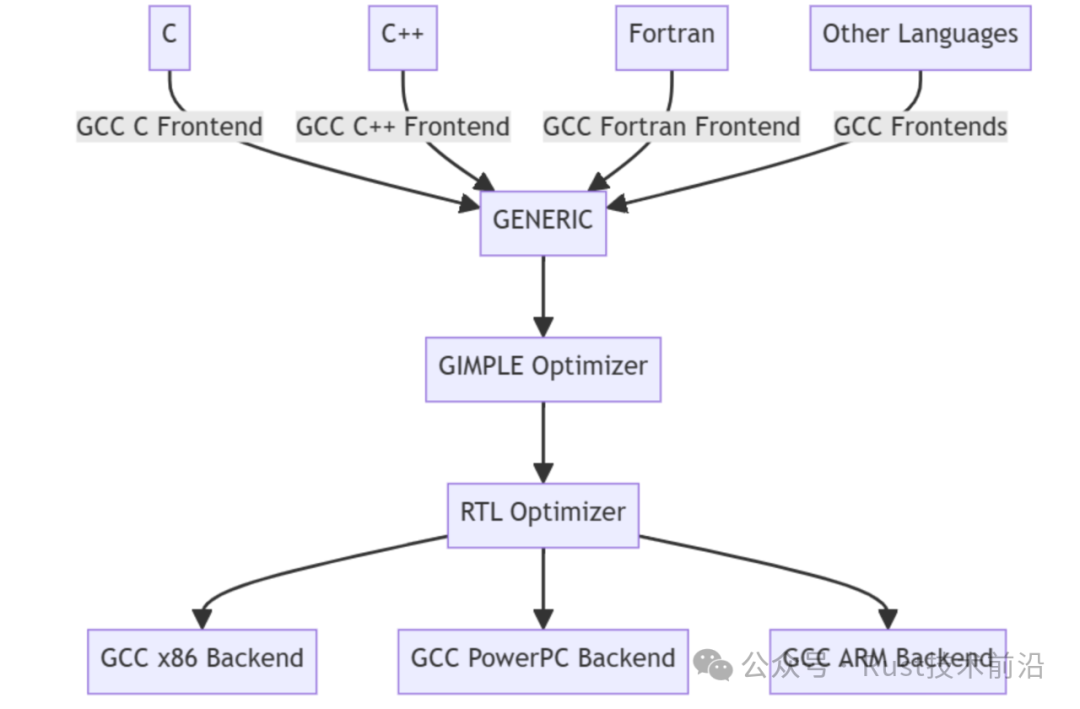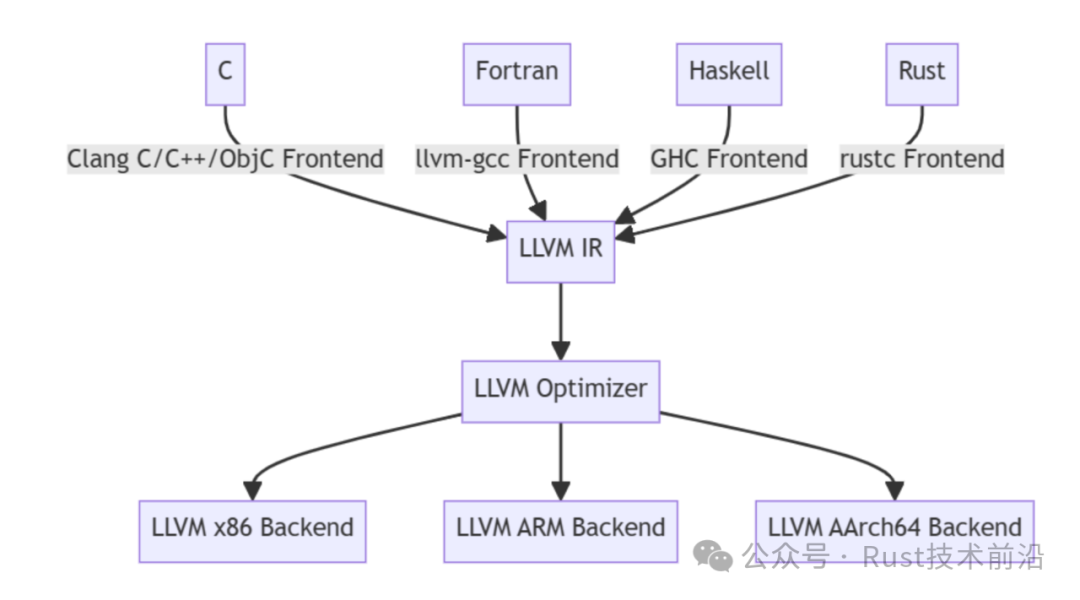The Rust compiler is renowned for its ability to optimize code performance and manage memory, thanks to its borrow checkers. Rust code is compiled using the official compiler <span>rustc</span>, which utilizes LLVM as its backend to optimize and convert high-level Rust code into low-level machine code. However, a recent alternative has emerged called gccrs, which is a Rust compiler based on the GCC frontend.
What is LLVM?
LLVM is a collection of reusable compiler and toolchain components. Although the technical meaning of LLVM is “Low-Level Virtual Machine,” this acronym now more commonly represents the brand of the project itself. LLVM is known for its ability to optimize code and generate high-performance machine code, supporting multiple programming languages.
The standard compiler architecture can be divided into frontend, middle-end, and backend. The frontend is responsible for translating high-level programming languages into an intermediate representation (IR), a process that is similar across different compilers, including LLVM and GCC. The middle-end applies various optimization techniques to the code, such as loop unrolling and function inlining. LLVM IR is the intermediate representation of LLVM, which can be optimized for multiple different backends based on the target architecture.
Since its inception, LLVM has been the default backend for the Rust compiler <span>rustc</span>, and the collaboration between the two has been very successful, as LLVM’s advanced optimization techniques allow the code to run on multiple platforms.
What is GCC?
GCC, or the GNU Compiler Collection, is an open-source collection of compilers that supports various programming languages, including C, C++, and Fortran. It is widely praised for its stability, reliability, and extensive support for different architectures and operating systems. As demand has grown, GCC has expanded to support Ada, Java, Go, and most recently, Rust, which is still under development.
GCC has a separate frontend for each language, which converts the programming language into an abstract syntax tree (AST). The AST serves as an intermediary between the frontend and the middle-end. Unlike LLVM, GCC has an RTL stage after GIMPLE, which further transforms the code into a low-level representation similar to assembly instructions.
GCC vs. LLVM: Architectural Differences
GCC employs a more traditional compilation approach, first using the frontend to parse the source code and generate an AST, which is then converted into GIMPLE, an intermediate representation that preserves high-level program semantics. The code is then further transformed into RTL, a low-level representation closer to assembly language. In contrast, LLVM transitions directly from the frontend to its intermediate representation, LLVM IR, allowing LLVM to perform optimizations that benefit various languages and target architectures.


The most significant difference lies in their source code structure. LLVM’s modular design makes it easy to extend and can serve multiple languages and a wide range of backend machines. In contrast, GCC is designed as a monolithic compiler with tightly coupled components.
Setting Up Rust with GCC and LLVM
To use GCC to compile Rust code, you need to install gccrs. Here are the simplified steps:
sudo apt install build-essential libgmp3-dev libmpfr-dev libmpc-dev flex bison autogen gcc-multilib dejagnu
git clone https://github.com/Rust-GCC/gccrs
mkdir gccrs-build
cd gccrs-build
../gccrs/configure --prefix=$HOME/gccrs-install --disable-bootstrap --enable-multilib --enable-languages=rust
make
Once the installation is complete, you can use gccrs as the frontend compiler for Rust code. However, it is important to note that gccrs is still in early development and currently does not support most Rust syntax, especially macro functionality. Therefore, caution should be exercised when comparing the performance of GCC and LLVM in compiling Rust code. Compiling this Rust code using <span>rustc ./gccrs/gcc/testsuite/rust/compile/torture/type_infer1.rs type_infer1.rs</span> is very straightforward. However, if you attempt to compile the same Rust code using GCC as the frontend, you will need to pass more parameters. For example, you can run the following command using the built binary in the <span>gccrs-build</span> folder:
./gcc/crab1 ../gccrs/gcc/testsuite/rust/compile/torture/type_infer1.rs -frust-debug -Warray-bounds -dumpbase ../gccrs/gcc/testsuite/rust/compile/torture/type_infer1.rs -mtune=generic -march=x86–64 -O0 -version -fdump-tree-gimple -o test -L/lib/x86_64-linux-gnu -L/lib/../lib64 -L/usr/lib/x86_64-linux-gnu -L/usr/lib/../lib64 -frust-incomplete-and-experimental-compiler-do-not-use
This command will generate an executable file for running Rust code. The output may look similar to:
Analyzing compilation unit
Performing inter-procedural optimization
...
<simdclone> {heap 1704k} type_infer1::test type_infer1::main
Time variable usr sys wall GGC
Parsing phase : 0.00 ( 0%) 0.00 ( 0%) 0.01 ( 50%) 82k ( 24%)
Optimization and generation phase : 0.00 ( 0%) 0.01 (100%) 0.01 ( 50%) 121k ( 35%)
...
Note that gccrs is currently in early development and cannot import external packages or libraries, and only partially supports all features of the Rust language.
For the Rust community, gccrs is significant as it adds diversity to the ecosystem, allowing Rust to be flexibly utilized in more different environments. While rustc_codegen_gcc uses the frontend of rustc to generate intermediate representations for the GCC backend, which is relatively more stable, the existence of gccrs promotes community innovation. Given that GCC supports more older architectures, such as the Motorola 68000 (m68k), which are too outdated for LLVM to provide support.
In conclusion, although gccrs is not yet mature, it and LLVM each have unique advantages and goals, driving the development of Rust compilation. To delve deeper into this topic, consider exploring resources on how to comprehensively monitor the performance of Rust applications, automatically capture errors, and track network request speeds and loading times. This is akin to installing a DVR for your web and mobile applications, recording everything that happens, so you no longer have to guess the causes of issues.
「Click 👇 to follow」
Like + Share + View to quickly enhance your programming skills👇
Reference link: https://blog.logrocket.com/exploring-rust-compiler-options-gcc-vs-llvm/